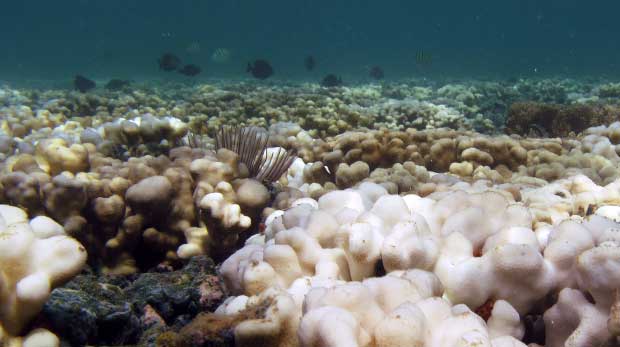
The quest to stabilize and restore coral reefs, a critical component of our ocean ecosystem, is receiving increased help through a unique research project supported by Microsoft co-founder Paul G. Allen’s Vulcan Inc. As ocean temperatures rise and oceans become more acidic, corals are declining in record numbers. A new project and winner of the 2013 Paul G. Allen Ocean Challenge will apply human-assisted evolution in developing resilient coral species to help reverse this decline.

“Not all corals are created equal,” said researcher and co-grantee Ruth D. Gates from the University of Hawaiʻi at Mānoa. “We will capitalize on those corals that already show a stronger ability to withstand the changing ocean environment and their capacity to pass this resilience along to new generations.”
The winning research team of Gates and Madeleine van Oppen from the Australian Institute of Marine Science was awarded the $10,000 grand prize and invited to submit a grant proposal for funding consideration. A nearly $4-million, five-year project agreement was reached in June of this year, with research timed to maximize this summer’s peak coral reproduction season in North America.
- Related: “Ruth Gates wins international Ocean Challenge,” October 17, 2013
“Paul Allen is deeply committed to ocean health and has a growing portfolio of programs targeted at the protection of marine life,” explained Dune Ives, senior director of philanthropy at Vulcan Inc. “This project uniquely addresses the need to reverse the rapid decline of our coral reef ecosystems.”
Initial research will be conducted in Hawaiʻi and Australia, providing an unparalleled opportunity to study different coral species, environmental conditions and human factors to generate stronger research conclusions than single-site data.

Hawaiʻi component working with resilient corals
At the University of Hawaiʻi’s Hawaiʻi Institute of Marine Biology on Coconut Island, Gates and her team are working with a set of corals that were unaffected by a warming event last year that caused bleaching in many of their neighboring adjacent strains. These resilient corals are being conditioned to survive in increasingly warmer and more acidic water. Gates refers to this as “training corals on environmental treadmills.” The goal is to induce greater resilience in the individual samples as well as in their offspring.
“Once we have a proof of concept, we’ll build a bank of coral stocks that are preconditioned to withstand the warmer and more acidic ocean conditions of the future,” said Gates. “Within the five-year grant period we should have a significant stockpile of highly resilient coral strains and a plan in place to use them to restore a completely denuded reef, as well as plant them on a partially damaged reef so they can reproduce with the existing corals and enhance the overall resilience of the vulnerable reef.”
Australian component examines selective breeding techniques
The Australian experiments will be conducted at the state-of-the art National Sea Simulator (SeaSim) located on the campus of AIMS headquarters in Cape Ferguson. The SeaSim allows for tightly controlled environmental factors including temperature and water acidity during the selective breeding-style activities.
The Australian component of the research will use human-assisted evolution. This is an innovative use of the age-old selective breeding techniques similar to those used in the agriculture industry. “Assisted evolution takes advantage of natural processes,” said van Oppen. “It accelerates the evolution of coral and with the rapid decline of coral health worldwide, the development of tools to help protect corals from stress is urgent.”
“At Vulcan, we are excited about this project because of the significant need that it addresses,” said Ives. “If coral reefs continue to decline due to warmer, more acidic ocean water, marine ecosystems will forever be altered with ripple effects that we don’t yet fully comprehend.”
For more information, read the Vulcan Inc. news release.
More on Ruth Gates
Three key University of Hawaiʻi staff contributed to Hawaiian voyaging canoe Hōkūleʻa exploration and research at Australia’s Great Barrier Reef in June. Read more
After the worst coral bleaching event ever recorded in Hawaiʻi, the Hawaiʻi Institute of Marine Biology at the University of Hawaiʻi at Mānoa is diligently monitoring and testing affected coral reefs in Kāneʻohe Bay. Read more

